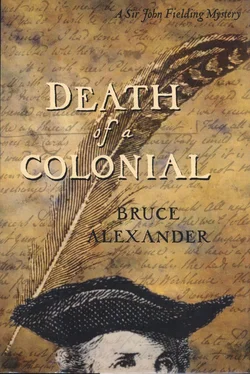Bruce Alexander - Death of a Colonial
Здесь есть возможность читать онлайн «Bruce Alexander - Death of a Colonial» весь текст электронной книги совершенно бесплатно (целиком полную версию без сокращений). В некоторых случаях можно слушать аудио, скачать через торрент в формате fb2 и присутствует краткое содержание. Год выпуска: 1999, ISBN: 1999, Издательство: Putnam Adult, Жанр: Исторический детектив, на английском языке. Описание произведения, (предисловие) а так же отзывы посетителей доступны на портале библиотеки ЛибКат.
- Название:Death of a Colonial
- Автор:
- Издательство:Putnam Adult
- Жанр:
- Год:1999
- ISBN:9780425177020
- Рейтинг книги:3 / 5. Голосов: 1
-
Избранное:Добавить в избранное
- Отзывы:
-
Ваша оценка:
- 60
- 1
- 2
- 3
- 4
- 5
Death of a Colonial: краткое содержание, описание и аннотация
Предлагаем к чтению аннотацию, описание, краткое содержание или предисловие (зависит от того, что написал сам автор книги «Death of a Colonial»). Если вы не нашли необходимую информацию о книге — напишите в комментариях, мы постараемся отыскать её.
Death of a Colonial — читать онлайн бесплатно полную книгу (весь текст) целиком
Ниже представлен текст книги, разбитый по страницам. Система сохранения места последней прочитанной страницы, позволяет с удобством читать онлайн бесплатно книгу «Death of a Colonial», без необходимости каждый раз заново искать на чём Вы остановились. Поставьте закладку, и сможете в любой момент перейти на страницу, на которой закончили чтение.
Интервал:
Закладка:
“Why, no trouble at all, Constable,” said Mr. Baker. “This corporal from the Tower and two of his men” — pointing down to the room at the end of the hall — “come by to assist in transporting a prisoner to Newgate, not knowing the prisoner was no longer here. They was just leaving. Isn’t that so, Corporal?’’
“That’s as is,” said the corporal, then called loud to the rest of his party: “Pringle! Lockert! We’re ready to go!”
And in less than a minute they indeed were gone. The three constables watched them leave, frowning until they were out of sight. Then did Mr. Perkins speak up.
“Gents,” said he, “we just won the Battle of Bow Street.”
“And not a shot fired,” said Mr. Baker.
All three did laugh then most merrily.
I had last seen Percival Mobley leaving Number 4 Bow Street under Mr. Fuller’s guard and in the company of Lord Mansfield. He was to be taken by them in the coach and four to a secret destination, one that was judged by Sir John to be safer than the strong room of the Bow Street Court. And so Mr. Baker told the corporal the exact truth when questioned by him; what he did not tell him, however, was that he had been forewarned by Sir John that he might expect such a visit during the night. Constables Bailey and Perkins had also been urged to look in from time to time on Mr. Baker, that they might be certain all went well for him.
When next I saw Mr. Mobley, he stood in the dock at the Old Bailey, defending himself against the charge of homicide. (I learned later that he had spent the night in one of the holding cells beneath the courthouse.) Directly he had concluded his business in Bow Street, Sir John had invited me to accompany him to the trial of Percival Mobley. Though I had no notion of what he, Lord Mansfield, and Mr. Mobley had planned during those hours of the afternoon — or indeed perhaps because I had no notion — I accepted his invitation eagerly, thinking perhaps I might even learn in the course of our short journey what I might expect during the trial. In that last I was quite disappointed, for he never breathed a word about what lay ahead; nevertheless, I should not have missed the experience of this trial for the world. Ultimately, it was one of the most instructive of my legal education.
As we arrived, Sir John was taken from me by a bailiff who conducted him through closed doors and thus out of sight. I sought a place in the section given to accommodate the public. There were not so many there, for the trial had been put on the docket at the last minute. Yet the gentlemen of the press were there in greater number than before. I recognized in the seats ahead of mine the three journalists who were at the Bow Street Court, and I saw that they had been joined by others of their kind. They were distinguished by their loud conversation and foolish laughter; I suspected that a few of them were drunk. Still, when the process began, all fell silent and began scribbling notes.
I was not entirely surprised when, just before the Lord Chief Justice made his entrance, Archibald Talley appeared, burbling at the pleasure of seeing me once again.
“I’ve missed you,” said he. “Where’ve you been?”
“Away,” said I, “out of the city — in Bath and Oxford.”
“Bath, is it? What had you — ”
Then came the command to rise and face Lord Mansfield as he took his place. Was it my imagination, or did he show a bit of spring in his step? I made room, and young Mr. Talley settled in beside me. Then: “Bring forth the prisoner!” Out came Mr. Mobley, clean-shaven and well kempt. He was an impressive figure. As he took his place in the dock, he commanded the attention of the jury in a way that I had not seen before during the trials I had witnessed at Old Bailey.
Young Mr. Talley leaned toward me. “This trial was not announced,” he whispered. “Do you know anything about it?”
“Rather a lot, actually.”
“He looks quite hale and strong. Who is he?”
“That would take too long to tell.”
He gave me an annoyed look, but I put a finger to my lips in a plea for silence. The trial began.
It went reasonably swiftly. The counsel for the prosecution rose and did no more than state the facts of the case as sworn to by Alfred Simmons, the night porter at the Globe and Anchor. Though the condition of the corpus of “Elijah Bolton” was described, it was done dispassionately. There was room aplenty for the prosecution to improvise upon the lurid details, yet the opportunity went ignored. Quite frankly, I was surprised.
The Lord Chief Justice thanked the counsel for the prosecution for his presentation and turned to Mr. Mobley.
“Do you dispute the facts as offered?” he asked him.
“I have no quarrel with them,” said the prisoner. “I do not dispute the facts as presented.”
“Then what have you to say in your own defense? “
Mr. Mobley looked about to commence, when the Lord Chief Justice silenced him with an upraised hand.
“If I may make a suggestion,” said the judge.
“Why, of course you may,” said the prisoner with a barely suppressed smile. “It is your courtroom.”
“So it is.” He reached beneath his robe and pulled out a sheaf of foolscap. “You gave a signed statement to Sir John Fielding concerning this case before the court. It seemed an extraordinarily succinct account of a matter most complicated when it was given to me to examine it. We might all be well served, the members of the jury in particular, if you were to read it now to the court.”
(I had never known Lord Mansfield to be so considerate, so polite, so kind! as he was at that moment with Mr. Mobley. Did this mark a change in his juridical behavior — or was he simply signaling to the jury that this fellow deserved a degree of respect? The latter, no doubt, though he seemed to be overplaying it a bit.)
Mr. Mobley agreed, of course, and the sheaf of papers was conveyed to him by way of a clerk. He unfolded them and began to read.
The reading took a bit of time. He in no wise rushed through it, but applied his gifts as an actor to the recitation. It was most pleasurable to hear my words given such treatment; and indeed they were my words, though he was their source. His rendition held those in the courtroom quite in thrall for the length of the reading. Though unmoved, the journalists who sat in the row ahead were specially excited by the mention of Sir Patrick Spenser’s name: Looks were exchanged, and their pencils fair flew across pages upon which they took their notes. When Mr. Mobley had done, bringing his audience to a pitch of keen arousal with his telling of the tale of his combat with Eli Bolt, he allowed himself to drop his head in a modest bow, a gesture somewhat out of place in the courtroom, yet one that seemed altogether fitting, considering the quality of his performance. “Does that conclude your defense?” asked the Lord Chief Justice. “No, my lord, I should like to call two witnesses.”
“Call them, then.”
“My first witness,” said Mr. Mobley, “is Gabriel Donnelly, medical examiner for the coroner of the City of Westminster.”
There was a delay of something over a minute as Mr. Donnelly, summoned from the witness room, made his way into the courtroom. Then, led by a bailiff, he took his place at the witness stand.
The prisoner put to him a number of questions which were meant to establish Mr. Donnelly’s expertise on medical questions, how he came to view the body of Eli Bolt, and so on. But then the questioner and his respondent came to the heart of the matter, as the good doctor was asked to describe the condition of the body. Much was said in answer, but the key to it all was provided in this exchange between them:
Mr. Mobley: “You have read my statement to Sir John Fielding?” Mr. Donnelly: “I have, Sir John gave it me to read without comment.”
Читать дальшеИнтервал:
Закладка:
Похожие книги на «Death of a Colonial»
Представляем Вашему вниманию похожие книги на «Death of a Colonial» списком для выбора. Мы отобрали схожую по названию и смыслу литературу в надежде предоставить читателям больше вариантов отыскать новые, интересные, ещё непрочитанные произведения.
Обсуждение, отзывы о книге «Death of a Colonial» и просто собственные мнения читателей. Оставьте ваши комментарии, напишите, что Вы думаете о произведении, его смысле или главных героях. Укажите что конкретно понравилось, а что нет, и почему Вы так считаете.












